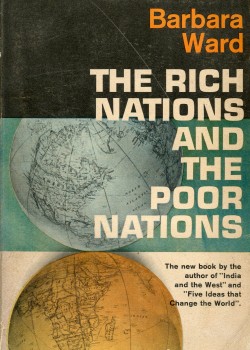
The Rich Nations and the Poor Nations
The New Bookby the Author of "India and the West" and "Five Ideas that Change the World"
Author : Ward, B.
Publisher: W.W.Norton & Company
Place of Publish: USA, New York
Year: 1962
Page Numbers: 159
Acc. No: 4591
Class No: 339.46 WAR
Category: Books & Reports
Subjects: Poverty
Type of Resource: Monograph
Languages: English
In these lectures the Author analyzes the origins and nature of the present predicament of under-developed countries that are facing a double challenge - they face an enormous challenge of change and an equally vast challenge of choice. She suggests how the West might most effectively assist them to achieve their aspirations. Interesting to read an as-it-is-happening perspective on the role of Communism and Capitalism in the post-colonial developing world. With 20/20 hindsight, the book shows a great deal of perception and understanding about the root issues, as well as what should be done about it. The book talks about the differentiation of countries toward each other. The book has six (6) chapters: The Rich Nations, The Poor Nations, Communism Blue Print, The Economics of Development, The Politics of Development, and lastly Not by Bread Alone. Individually, it discusses topics that may help the low-economy country to rise like the others. Each chapter, although individually implied, relate their discussions to one another. We live in a most catastrophically revolutionary age that men have ever faced. Revolutions is not what we think about an event or series of interconnected event but it is ideas that changes our ways of life, the way we look things, changes everything out of recognition and changing it fast. The distinction between rich nations and poor nations is one of the great dominant political and international themes of our country. Underdeveloped is not the best way to describe the poor nations because some of them had been in the great civilization. Communism is a sort of resume of the revolutions that make up modernization and it offers a method of applying them speedily to societies caught fat in the dilemmas of transition.



